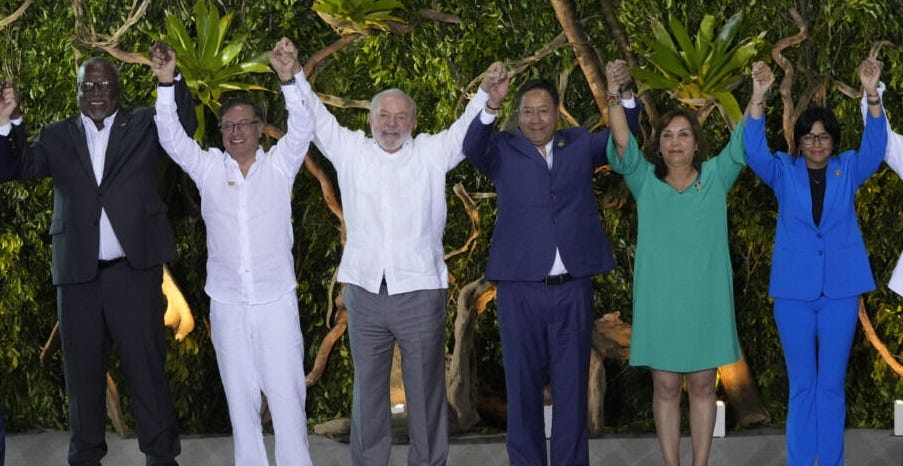Argentina heads to the polls Sunday for the first round of Presidential elections
The election may be ripe for an outsider who represents a departure from the traditional Argentinian political parties.
BUENOS AIRES, ARGENTINA - On Sunday Aug. 13, Argentines will head to the polls to vote in the nation’s presidential primaries. The nation is celebrating 40 years of democracy since the fall of the country’s dictatorship, but also reeling over hyperinflation, an economy on the brink of recession, and political scandal.
And voters seem eager for change.
All of Argentina’s diverse political coalitions are running new candidates rather than incumbents — current President Alberto Fernández has said he will not throw his hat in the ring for October elections. His coalition, the Peronist, Unión por la Patria (UxP), is running two candidates: centrist Sergio Massa, an economic minister who has the support of coalition leaders and party faithful, and left-wing lawyer Juan Grabois. Massa is expected to win the primary easily to become the Peronist contender.
But the election may be ripe for an outsider who represents a departure from the traditional Argentinian political parties.
In April 2022, Javier Milei, a National Deputy who has developed a cult following in recent years for his ultra-right and often controversial statements, announced his candidacy for president. He is the founder of the La Libertad Avanza (LLA) party and has promised to up-end the traditional system of politics in Argentina as a strategy to rescue the country from its mounting problems.
Milei has said on national television that if elected, he will abolish the central bank, replace the Argentine peso with the US dollar, get rid of comprehensive sex education, and repeal legislation from 2020 that legalized abortion. Enacting these proposed changes face many obstacles and requires acts of Congress. It is unknown if Milei can secure enough support for these policies if elected president.
Milei appeals to voters’ anger and dissatisfaction over the bad economy and the errors and corruption of prior left and right-wing administrations alike. He started out with little support but as the economic situation worsened, voters soured on the two main political coalitions of the left and the right, and many turned towards Milei as a viable third-party option.
Voters take a strategic approach to first-round voting
Among traditional left-wing and Peronist voters, many do not see UxP winning this year’s elections due to the current government’s low approval rating. “I don’t think they plan to win, I don’t think they have a chance to win,” said Camila Szereszewski, a 27-year-old school teacher from Buenos Aires. “I actually think the right are going to win,”.
Szereszewski values human rights and social activism. She can’t imagine herself or others like her voting for a right-wing candidate. She plans to vote for center-left Massa over Grabois in the primaries. Massa is currently polling at 24%, comparedd to Grabois at 6.7%.
“I think I will vote strategically, who I think has more chances to beat the right. I think that’s Massa, I couldn’t have ever pictured myself voting for him[otherwise,” she told Pirate Wire Services.
Other voters who share Szereszewski’s view that the ruling Peronists do not have a chance to win have also shifted their focus. Primary elections in Argentina are not closed and anyone can vote in any coalition’s primary. As a result, the race in the center-right coalition, Juntos por el Cambio (JxC), has gained a lot of attention.
Two candidates are vying to be the center-right candidate, current centrist Buenos Aires City Mayor, Horacio Rodríguez Larreta, and Patricia Bullrich, former Minister of Security in the previous Macri right-wing government.
Bullrich’s complex history as a former member of a left-wing guerilla organization known as “the Montoneros” during the last military dictatorship in her youth, her ideological turn to the right, and her controversial far-right decisions as security minister have polarized her candidacy among detractors and supporters alike.
Larreta’s two terms as Buenos Aires City Mayor has gained him many supporters among people who plan to vote strategically and consider him pragmatist.
“I have actually considered voting strategically for Larreta just so that Patricia Bullrich doesn’t win,” said Julián Martínez Mayer, a 28-year-old doctoral student in biology at the University of Buenos Aires.
Center-Right Coalition hopes they can seize the moment
Martínez Mayer normally would not vote for the center-right coalition. He remembers former right-wing President Mauricio Macri cutting funding to science programs. He ultimately wants to ensure if a right-wing candidate wins the presidency, that the candidate is someone he can tolerate. As a native of Buenos Aires City, Martínez Mayer is familiar with Larreta and his positions.
“I would much prefer to have Larreta govern, we know how he governs and the city is more or less ok. Patricia has a complicated history with far right policies,” said Martínez Mayer. However, even with Patricia Bullrich present in the primaries, the far-right has already arrived in Argentina.
“Bullrich is much more closely aligned with Milei, if she wins, it opens up the door to the far right and I don’t want that,” said Martínez Mayer. He is an example of many voters who are taking into consideration who to strategically vote for based on other coalition’s eventual nominees.
“The situation in the country is not only the fault of one president or three or four, it is the fault of two hegemonic political parties that have governed for decades,” Javier Wiles, a 19-year-old Milei supporter from San Vincente in Buenos Aires Province.
“Young people are the ones that are the most tired, and the ones that most want to leave the country,” Wiles said. Within the last 10 years, Argentina’s youth have lived through unstable economic conditions and for many, they don’t see any alternative than to change the system completely.
“Let it raze, annihilate, completely destroy everything,” Wiles said. Wiles is a campaign manager and vice-president of the Milei party youth wing in San Vincente. He’s been inspired by the far-right politicians’ rhetoric and promise for a better future. Many are choosing to vote strategically for Milei to send a message to the two main coalitions, and this is reflected in national polls where he is averaging 20% of voting intentions.
The upcoming primaries will be a formality for Milei since he is running unopposed in his party, but his influence is still felt in the other primary races.
Polls open on Sunday Aug 13, and by Monday evening, Argentines will know who will appear on their ballots on general election day on Oct. 22.
The Big Headlines in LATAM
Presidential candidate Fernando Villavicencio was assassinated in Quito, Ecuador on Wednesday. He had run an anti-corruption and anti-graft campaign, and was an outspoken opponent of organized crime, which has grown considerably in recent years.
Before becoming a politician, Villavicencio was a journalist and a whistleblower who uncovered corruption within the Correa government and was known for his investigative work. One of the presumed assailants was killed by security staff immediately after the murder. The Ecuadorian government stated they have arrested 6 other suspects in the killing— 6 Colombians and 1 Venezuelan national— but declined to give further details.
What we’re writing
This week at the Ship’s Log for paid subscribers, Joshua wrote about a burgeoning controversy at Lula's Regional Amazon conference in Belem, Brazil. He has advocated for policies that reduce deforestation in the Amazon, but his energy policy is at odds with that goal.
As he cuts back on illegal logging and mining, he also advocates for more than 150 oil drilling projects in the Amazon basin, and even his regional allies are criticizing the decision.
Lula's "Drill Baby, Drill" policy at Amazon Summit faces pushback from Colombia's Petro
This is the latest installation of the “Ship’s Log” for paid subscribers at Pirate Wire Services, a series of more personal reflections or deeper analyses of the beats we cover as freelance journalists. If you haven’t taken out a paid subscription, we ask that you consider doing so. It allows us to continue bringing you in-depth stories week after week.
Spanish Word of the Week
Empalagoso, empalagosa - “sickly sweet” or “saccharin”
Ever eaten something that was just too sweet? Or had an experience so artificially cute that it was unattractive? It’s a good opportunity to use empalagoso.
Joshua es demasiado empalagoso, como si estuviese buscando atención - Joshua is too [cuddly/clingy/affectionate] as if he was desperate for attention







